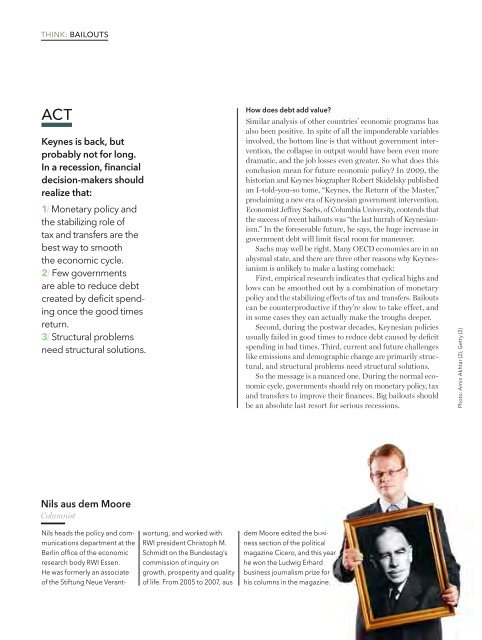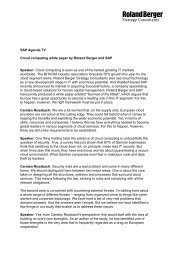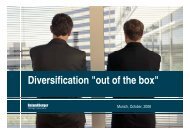think: act magazine No. 17 - Size Matters - Roland Berger
think: act magazine No. 17 - Size Matters - Roland Berger
think: act magazine No. 17 - Size Matters - Roland Berger
You also want an ePaper? Increase the reach of your titles
YUMPU automatically turns print PDFs into web optimized ePapers that Google loves.
<strong>think</strong>: baiLOutS<strong>act</strong>keynes is back, butprobably not for long.in a recession, financialdecision-makers shouldrealize that:1/ monetary policy andthe stabilizing role oftax and transfers are thebest way to smooththe economic cycle.2/ Few governmentsare able to reduce debtcreated by deficit spendingonce the good timesreturn.3/ structural problemsneed structural solutions.how does debt add value?Similar analysis of other countries’ economic programs hasalso been positive. In spite of all the imponderable variablesinvolved, the bottom line is that without government intervention,the collapse in output would have been even moredramatic, and the job losses even greater. So what does thisconclusion mean for future economic policy? In 2009, thehistorian and Keynes biographer Robert Skidelsky publishedan I-told-you-so tome, “Keynes, the Return of the Master,”proclaiming a new era of Keynesian government intervention.Economist Jeffrey Sachs, of Columbia University, contends thatthe success of recent bailouts was “the last hurrah of Keynesianism.”In the foreseeable future, he says, the huge increase ingovernment debt will limit fiscal room for maneuver.Sachs may well be right. Many OECD economies are in anabysmal state, and there are three other reasons why Keynesianismis unlikely to make a lasting comeback:First, empirical research indicates that cyclical highs andlows can be smoothed out by a combination of monetarypolicy and the stabilizing effects of tax and transfers. Bailoutscan be counterproductive if they’re slow to take effect, andin some cases they can <strong>act</strong>ually make the troughs deeper.Second, during the postwar decades, Keynesian policiesusually failed in good times to reduce debt caused by deficitspending in bad times. Third, current and future challengeslike emissions and demographic change are primarily structural,and structural problems need structural solutions.So the message is a nuanced one. During the normal economiccycle, governments should rely on monetary policy, taxand transfers to improve their finances. Big bailouts shouldbe an absolute last resort for serious recessions.photo: Amin Akhtar (2), Getty (2)nils aus dem mooreColumnistNils heads the policy and communicationsdepartment at theberlin office of the economicresearch body rWI essen.He was formerly an associateof the stiftung Neue verantwortung,and worked withrWI president christoph m.schmidt on the bundestag’scommission of inquiry ongrowth, prosperity and qualityof life. From 2005 to 2007, ausdem moore edited the businesssection of the political<strong>magazine</strong> cicero, and this yearhe won the Ludwig erhardbusiness journalism prize forhis columns in the <strong>magazine</strong>.

















